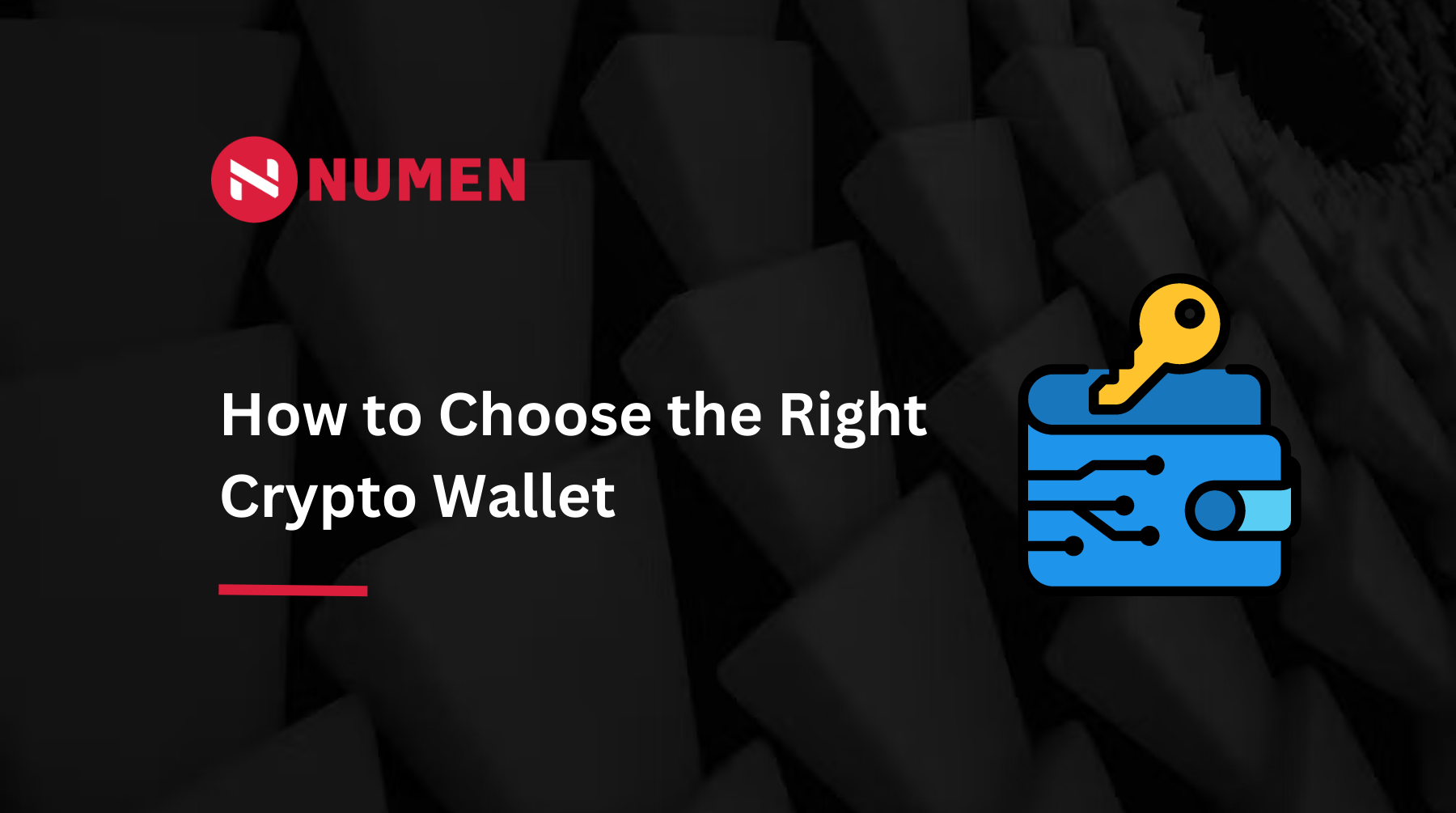
With the ongoing growth of the Web3 ecosystem, security incidents in the industry have unfortunately become more frequent. At Numen Cyber, we aim to provide valuable security insights through this article in order to mitigate the occurrence of such events.
What is a Cryptocurrency Wallet?
A cryptocurrency wallet serves as a fundamental tool for storing, managing, and exchanging tokens. It primarily functions by storing private keys or granting access to them, which are essential for verifying ownership of specific cryptocurrency assets.
However, a cryptocurrency wallet offers more than just key storage; it facilitates engagement with blockchain networks. By utilizing a wallet, users can effortlessly check token balances, send and receive tokens, and track transaction history.
Private Keys vs Public Keys
When you create a cryptocurrency wallet, a random number generation algorithm generates a pair of keys: a private key and a public key. These keys are of utmost importance in the world of cryptography. Let’s delve into their significance and functionalities.
Private keys serve as the cornerstone of transaction signing and asset operations. They provide the cryptographic proof of ownership for a specific cryptocurrency address. As a user, you typically only need to remember and safeguard your private key. With the private key in your possession, you gain exclusive control over the assets associated with the corresponding cryptocurrency address. It is imperative to keep your private key secure and refrain from sharing it with others.
In contrast, the public key is derived from the private key through a specific encryption algorithm. While the public key is mathematically related to the private key, it is computationally infeasible to reverse-engineer the private key from the public key alone. The public key has its own crucial role: it is employed to generate the wallet address and verify the authenticity of transaction signatures.
Both private and public keys are vital components of secure communication and transaction processes within the cryptocurrency realm. Wallets typically associate the public key with its corresponding private key and store them together. This cohesive pairing enables the wallet to encrypt and decrypt information, as well as validate digital signatures with precision.
What is a Wallet Address?

The wallet address plays a direct role in relation to the public key and is typically obtained through a specific hash function. This address is publicly accessible and serves as a unique identifier for receiving cryptocurrencies, akin to an account number for a bank account. It is important to note that each cryptocurrency has its own distinct format for wallet addresses. Let’s explore some examples to illustrate this concept:
Bitcoin wallet addresses commonly commence with either “1” or “3,” taking the form of 1BvBM… or 3J98t1…, respectively. These addresses are specific to the Bitcoin blockchain.
On the other hand, Ethereum and ERC-20 token wallet addresses universally begin with “0x” followed by 40 hexadecimal characters. For instance, an Ethereum wallet address could be 0x4bbeEB06…
Types of Cryptocurrency Wallets
Cryptocurrency wallets cater to different user needs and can be classified into three main categories: software wallets, hardware wallets, and online wallets. Let’s explore each category in detail:
Software Wallets
These wallets are software applications that can be installed on computers or mobile devices. They are responsible for generating and managing private keys, providing users with a user-friendly interface for convenient token transactions. Software wallets offer flexibility and accessibility, allowing users to engage with their cryptocurrencies on the go.
Hardware Wallets
Hardware wallets are physical devices similar to USB drives. They excel in providing an extra layer of security by securely storing private keys within the device itself. With private key generation and protection mechanisms, hardware wallets minimize the risk of malicious software or network attacks. They are widely regarded as one of the most secure options for storing cryptocurrencies.
Online Wallets
Online wallets, also known as cloud wallets, are stored on remote servers and accessed through the internet. They offer the advantage of accessibility from any device with an internet connection. Online wallets are often integrated with cryptocurrency exchanges, facilitating seamless transactions. However, it is crucial to exercise caution when using online wallets due to potential security vulnerabilities associated with cloud storage. Implementing robust security measures is essential to safeguard your assets.
In addition to these main categories, wallets can be further classified based on their specific platforms, such as mobile wallets, desktop wallets, browser wallets, and hardware wallets. The classification method itself is not of utmost importance; what truly matters is selecting the wallet that aligns with individual preferences and requirements.
How to Choose a Cryptocurrency Wallet

Although we refrain from offering specific cryptocurrency wallet recommendations, we can provide some guidelines to assist you in selecting an appropriate wallet:
Security
Prioritize downloading wallets from official sources and thoroughly assess their security track record and user reviews. This step ensures that you choose a reputable and secure wallet provider.
Multiple Token Support
Opt for a wallet that supports the cryptocurrencies you possess. This compatibility will facilitate efficient asset management and seamless transactions across your various holdings.
User Interface
Look for a wallet that boasts an intuitive and user-friendly interface. A well-designed interface simplifies wallet operations and enhances the overall user experience.
Functionality
Consider the breadth of features offered by different wallets. Assess whether they provide built-in transaction capabilities, exchange services, staking options, or other unique features. Choosing a wallet with a diverse range of functionalities can enhance your cryptocurrency management experience.
Best Practices for Secure Cryptocurrency Wallet Usage
Private Key Security
Protect your private key, which grants access and control over your cryptocurrency assets. Store it securely offline, away from potential threats, and refrain from sharing it with others.
Mnemonic Backup
Create a backup of your mnemonic phrase, as it serves as a critical recovery tool for your wallet. Store the backup securely offline, in a location resistant to loss or damage.
Confidentiality and Safe Storage
Avoid displaying or storing private keys, mnemonic phrases, or any sensitive information in public places or unsafe environments. This precaution ensures unauthorized individuals cannot access your wallet.
Regular Software Updates
Stay vigilant by regularly updating your wallet application. By doing so, you benefit from the latest security patches and feature enhancements, reinforcing the overall security of your wallet.
Caution with Public Networks
When utilizing software wallets, exercise caution when performing sensitive operations, especially when connected to public Wi-Fi networks or untrusted networks. These environments can potentially expose your information, leading to privacy breaches.
Transaction Verification
Prioritize meticulous verification of recipient addresses and transaction details before proceeding with any cryptocurrency transactions. This attention to detail ensures accurate and secure transfers, minimizing the risk of fund loss.
Prevention of Social Engineering Attacks:
Remain vigilant against social engineering attacks that aim to trick you into revealing your private key or mnemonic phrase. Be skeptical of unsolicited messages or communications received through social media, email, or other channels. Exercise caution and refrain from sharing sensitive information.
Final Thoughts
Selecting the appropriate cryptocurrency software wallet is of utmost importance, especially for beginners. It is essential to prioritize security and user-friendliness when making your choice. Take necessary precautions, such as securely storing private keys and mnemonic phrases, keeping your wallet software up to date, and refraining from conducting operations in insecure network environments.
By adhering to these security measures, you can confidently manage and trade your cryptocurrency assets, knowing that your investments are well-protected.
Lately, there has been an uproar within the Web3 community over Ledger’s recent announcement of their new wallet features. If you’re interested in learning more about MPC wallets, do give our article here a read.
If you require assistance with your wallet’s security, we’d be glad to help. Please do not hesitate to contact us.


